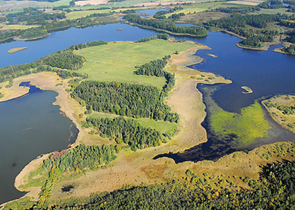Nature Conservation 3/2010 — 22. 6. 2010 — Nature and Landscape Management — Print article in pdf
Shall Reed Beds Be Restored in the Velký and Malý Tisý Fishponds National Nature Reserve?

In the Velký and Malý Tisý Fishponds National Nature Reserve (Třeboň Basin Protected Landscape Area and Biosphere Reserve, South Bohemia), reed beds have been substantially declining since the 1950s.
The process has substantially negatively affected not only birds, but also the ecosystem as a whole. Therefore, special fishpond management has been proposed and tested to reverse the unfavourable trend and to restore the reed beds. Following issues were studied: (1) decreasing water level effects – during the first year of a two year commercial management cycle, water level was decreased to make a bottom strip along the fishpond shore; alternative fish stock effects – a fish stock without the Common Carp (Cyprinus carpio) or a reduced fish stock were introduced into a shallow bay separated by a wire fence preventing carps from entering the bay. Since 1998, the condition of reed beds (moving of the edge line close to water level, changes in the total area) and total plant species diversity along the fishpond shore in the separated bay and outside it have been compared. Moving of the edge reed bed line was monitored at fenced permanent plots in 1998–2004 and on permanent transects from water level to the shore through the reed beds (since 1998). The experiment revealed (1) a negative effect of numerous fish stock on submersed and littoral vegetation (mechanical damage and increase in water turbidity); a positive effect of regular decreasing in water level during the first year of the commercial management cycle (soil aeration and seed recovery); a negative effect of high water level in the summer season (limited vegetative and seed reproduction in plants, plants with flooded tops die, spring floods caused by snow-melt do not matter, but floods resulted from summer heavy rainfall do); a negative effect of increasing habitat eutrophication (increase in water turbidity, algal and cyanobacterial bloom); a negative effect of the overpopulated Wild Boar (Sus scrofa) causing damages to young reed rhizomes. For restoring the reed beds, reduction in fish stock numbers combined with regular water level decreasing seems to be an optimal way of fishpond management in the above Specially Protected Area.

